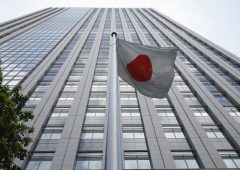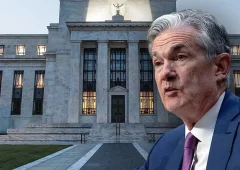U.S. Recession Risk at 35% Despite Market Volatility, Says JPMorgan CEO
08.08.2024 15:10 2 min. read Alexander Stefanov
JPMorgan Chase CEO Jamie Dimon recently commented on the US economy, saying that it has "not entered a recession at all" despite the market volatility seen this week.
He stressed that market fluctuations are often an overreaction and can occur for a variety of reasons, some of which are minor.
Dimon’s comments came after a volatile market period triggered by a weaker-than-expected employment report, lackluster earnings from technology activities and a slowdown in the carry trade.
Despite these events, he asserted that the current economic situation did not indicate a recession, although he acknowledged that the probability of a recession was higher than a smooth economic continuation.
Dimon also highlighted several uncertainties affecting the economic outlook, including geopolitics, the U.S. deficit, quantitative tightening, housing issues and the upcoming election. Although his company increased the probability of a recession to 35% by year-end, Dimon maintained a cautious but calm outlook on day-to-day market fluctuations.
In contrast, Goldman Sachs CEO David Solomon presented a slightly more optimistic view, suggesting that the economy could continue to grow without a recession, though he did not completely rule out that possibility.
Since the beginning of the year, JPMorgan and Goldman Sachs stocks have posted significant gains, reflecting some market confidence in these institutions despite broader economic uncertainty. Dimon noted that while consumer credit losses have normalized since the pandemic, future employment reports will be crucial indicators of consumer health.
The Federal Reserve is expected to begin cutting interest rates in September, with the first cut expected to be 50 basis points. Dimon expressed confidence in the Fed’s decision-making, though he noted that economic forecasts have often been inaccurate.
Finally, he hinted at his possible departure from JPMorgan, mentioning that the term “is no longer five years” and that the replacement process is underway. He suggested he might serve as chairman for a year or two after stepping down as CEO. When asked about the possibility of working in the Trump administration, Dimon expressed satisfaction with his current role.
-
1
U.S. PCE Inflation Rises for First Time Since February, Fed Rate Cut Likely Delayed
27.06.2025 18:00 1 min. read -
2
Key U.S. Economic Events to Watch Next Week
06.07.2025 19:00 2 min. read -
3
Gold Beats U.S. Stock Market Over 25 Years, Even With Dividends Included
13.07.2025 15:00 1 min. read -
4
U.S. Announces Sweeping New Tariffs on 30+ Countries
12.07.2025 16:30 2 min. read -
5
US Inflation Heats Up in June, Fueling Uncertainty Around Fed Cuts
15.07.2025 16:15 2 min. read
BitGo Files Confidentially for IPO With SEC
BitGo Holdings, Inc. has taken a key step toward becoming a publicly traded company by confidentially submitting a draft registration statement on Form S-1 to the U.S. Securities and Exchange Commission (SEC).
Crypto Greed Index Stays Elevated for 9 Days — What it Signals Next?
The crypto market continues to flash bullish signals, with the CMC Fear & Greed Index holding at 67 despite a minor pullback from yesterday.
U.S. Public Pension Giant Boosts Palantir and Strategy Holdings in Q2
According to a report by Barron’s, the Ohio Public Employees Retirement System (OPERS) made notable adjustments to its portfolio in Q2 2025, significantly increasing exposure to Palantir and Strategy while cutting back on Lyft.
Key Crypto Events to Watch in the Next Months
As crypto markets gain momentum heading into the second half of 2025, a series of pivotal regulatory and macroeconomic events are poised to shape sentiment, liquidity, and price action across the space.
-
1
U.S. PCE Inflation Rises for First Time Since February, Fed Rate Cut Likely Delayed
27.06.2025 18:00 1 min. read -
2
Key U.S. Economic Events to Watch Next Week
06.07.2025 19:00 2 min. read -
3
Gold Beats U.S. Stock Market Over 25 Years, Even With Dividends Included
13.07.2025 15:00 1 min. read -
4
U.S. Announces Sweeping New Tariffs on 30+ Countries
12.07.2025 16:30 2 min. read -
5
US Inflation Heats Up in June, Fueling Uncertainty Around Fed Cuts
15.07.2025 16:15 2 min. read



